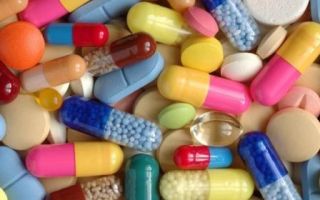Content
To understand what antihistamines are, you need to understand what histamines are and how antihistamines act on them.
Histamines are substances found in so-called "mast cells". After contact with the allergen, histamines are released from mast cells in order to neutralize the provoking substance. It is histamines that affect the penetrating ability of blood vessels and cause the manifestation of all known allergy symptoms (itching, swelling, redness, lacrimation, blisters, rash, etc.) There are three types of receptors that, reacting to a connection with histamine, have different effects:
1. H1 receptors . When combined with histamine, they cause itching, bronchopulmonary spasms, and increase the permeability of the walls of blood vessels.
2. H2 receptors . They react to histamines by relaxing the muscles of the uterus, increasing the secretion of the stomach, and increasing the contractility of the myocardium.
3. H3 receptors . Able to inhibit the production of histamine and prevent it from entering the nervous system.
Now it will be much easier to understand what antihistamines are and exactly how they work.
Mechanism of action
Antihistamines are substances that have the ability to block (inhibit) the sensitivity of receptors to histamine and stop an acute immune response. Different substances are aimed at inhibiting different types of receptors and, accordingly, have a different scope:
- H1 blockers. Relieve allergy symptoms
- H2 blockers. Contribute to a decrease in gastric secretion, are used in the treatment of stomach diseases;
- H3 blockers. Used in the treatment of diseases of the central nervous system.
Drugs containing H1 receptor inhibitors were invented as early as 1936 and have been constantly improved since then. To date, there are antihistamines I, II and III generation.
Antihistamines of the 1st generation
The main advantage of drugs of the first generation is the ability to quickly stop the immune response. At the same time, the effect does not last long - about 4-6 hours.
The main disadvantage is the ability to penetrate the blood-brain barrier. As a result, CNS depression occurs. The sedative effect can vary in severity and manifests itself in such signs as: drowsiness, loss of attention, apathy. Psychomotor agitation is also possible.
The sedative effect of the first generation drugs causes contraindications for use for people whose activities require special care or involve high physical activity.
Among the side effects:
- weakness;
- headache;
- nausea, vomiting;
- stool changes;
- dry mucous membranes;
- drop in blood pressure;
- muscle weakness;
- drowsiness;
- arrhythmia.
What are antihistamines of the first generation, in fact, almost every one of us knows. They are the most affordable, common and often used for emergency relief of allergy symptoms, treatment of allergies of unknown origin, to relieve itching and reduce skin reactions, with allergic rhinitis, motion sickness, migraine, asthma.
I generation drugs are addictive, so long-term use is unacceptable. The course of admission can not exceed 7-10 days.
In the group I generation: "Suprastin", "Daizolin", "Dimedrol", "Tavegil", "Fenkarol".
Second generation antihistamines
Medicines of the second generation are more perfect and have no inhibitory effect on the central nervous system. The antihistamine action occurs quickly and lasts 24 hours, that is, a single dose is enough per day.
The main disadvantage is the cardiotoxic effect. Second generation antihistamines are able to block the potassium channels of the heart muscle. As a result - failures in the work of the heart. This effect is enhanced by the concomitant use of antidepressants, macrolides, antifungal drugs, grapefruit juice.
II generation funds are not prescribed for the elderly, patients with heart disease, and people with severe liver dysfunction.
Possible side effects:
- dry mucous membranes;
- nausea and vomiting;
- anxiety;
- depression;
- stool disorders;
- headache;
- gastritis.
Second generation antihistamines are used in the treatment of Quincke's edema , allergic rhinitis, hay fever , urticaria , eczema, and atopic diseases.
Duration of admission can be up to 12 months.
The second generation group of drugs includes: Loratadin, Fenistil, Claritin, Lomilan, Cladidol, Rupafin, etc.
Third generation antihistamines
What are 3rd generation antihistamines? These are special substances - products of metabolic processes of drugs of the second generation, the so-called "active metabolites". Metabolites are devoid of the shortcomings of I and II generation drugs: CNS depression and cardiotoxic effects are eliminated, negative effects on the liver, kidneys and gastrointestinal tract are excluded.
Active metabolites are acceptable for use in a wide range of patients for the treatment of allergic conjunctivitis, rhinitis, hay fever, atopic dermatitis, urticaria, eczema, asthma.
Side effects are practically reduced to zero values. However, occasionally:
- headache;
- muscle pain;
- weakness;
- gastritis;
- nausea, vomiting;
- arrhythmia;
- dry mucous membranes.
III generation drugs are acceptable for use on an ongoing basis.
A contraindication for taking metabolites is pregnancy, early childhood, individual intolerance to any of the components.
The group of metabolites includes the following drugs: Zirtek, Telfast, Erius.
Medicines for children
Most antihistamines are contraindicated for use in early childhood. However, it is infants who are often prone to allergic reactions . Therefore, only an experienced specialist should select a drug.
To quickly get rid of allergy symptoms in early childhood, let's take first-generation drugs. To eliminate skin manifestations, it is possible to use antihistamine ointments and creams.
During the entire course of taking antihistamines, the child's condition should be carefully monitored and if adverse reactions occur, you should immediately seek medical help!
What are antihistamines, only a specialist knows thoroughly, and only an experienced allergist can choose the drug and dosage that is right for you. Self-medication can lead to irreparable consequences!






